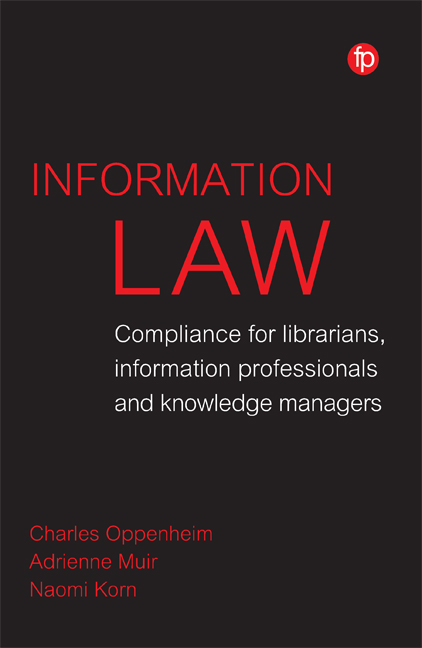Book contents
- Frontamtter
- Contents
- List of Acronyms
- List of Figures and Tables
- List of Case Studies
- Introduction
- 1 Copyright and Related Rights
- 2 Data Protection
- 3 Freedom of Information
- 4 Governance, Audits and Risk Assessment
- 5 Policies
- 6 Procedures: Copyright and Related Rights
- 7 Procedures: Using and Negotiating Licences for Access to Information Resources
- 8 Procedures: Data Protection and Freedom of Information
- 9 Tools and Templates
- 10 Awareness and Engagement
- 11 Some Speculations About the Future
- Appendix 1 Carrying out an Information Asset Audit
- Appendix 2 Sample IP Policy
- Appendix 3 Sample Data Protection Policy
- Appendix 4 Possible Contractual Terms for Online Access to Database Service
- Appendix 5 Data Protection Privacy Notice Template
- Bibliography
- Index
3 - Freedom of Information
Published online by Cambridge University Press: 29 July 2020
- Frontamtter
- Contents
- List of Acronyms
- List of Figures and Tables
- List of Case Studies
- Introduction
- 1 Copyright and Related Rights
- 2 Data Protection
- 3 Freedom of Information
- 4 Governance, Audits and Risk Assessment
- 5 Policies
- 6 Procedures: Copyright and Related Rights
- 7 Procedures: Using and Negotiating Licences for Access to Information Resources
- 8 Procedures: Data Protection and Freedom of Information
- 9 Tools and Templates
- 10 Awareness and Engagement
- 11 Some Speculations About the Future
- Appendix 1 Carrying out an Information Asset Audit
- Appendix 2 Sample IP Policy
- Appendix 3 Sample Data Protection Policy
- Appendix 4 Possible Contractual Terms for Online Access to Database Service
- Appendix 5 Data Protection Privacy Notice Template
- Bibliography
- Index
Summary
Introduction
Freedom of information (FoI) is legislation that obliges government and other public bodies to reveal documents, data collections, etc., to any members of the public, including the media. Many countries around the world have FoI laws, including the UK. The relevant legislation in England and Wales is the Freedom of Information Act 2000, which also covers Northern Ireland at the moment. Scotland has its own Freedom of Information (Scotland) Act 2002.
The following organisations, many of which employ LIK staff, are covered by UK FoI legislation:
◆ government departments
◆ local councils
◆ schools, colleges and universities
◆ health trusts, hospitals and doctors’ surgeries
◆ publicly funded museums
◆ the police
◆ non-departmental public bodies, committees and advisory bodies
◆ BBC and Channel 4.
The House of Commons and the Independent Parliamentary Standards Authority are both subject to FoI, but individual Members of Parliament are not.
This means that LIK workers working in such organisations need to understand the circumstances in which they may be asked for, and subsequently may (or may not) need to supply, information to third parties. Furthermore, professionals working in sectors not subject to FoI also need to be aware of the possibilities offered by FoI to help answer queries posed by their patrons.
UK FoI legislation includes a particularly long list of exemptions compared with the legislation in other countries. Unlike data protection, the UK's FoI laws are not tied to any EU Directive or Regulation.1 There is separate legislation in respect of information of relevance to the environment (the Environmental Information Regulations 2004, SI2004/and similar Scots legislation), but that is not considered further in this chapter.
In the EU, many individual member states have explicit FoI laws, or FoI is written into the country's constitution. In addition, a EU Regulation provides FoI for the three main EU institutions to EU citizens and natural or legal persons residing, or with registered offices in, a member state (Regulation (EC) No 1049/2001 of the European Parliament and the Council of 30 May 2001 regarding public access to European Parliament, Council and Commission documents).
- Type
- Chapter
- Information
- Information LawCompliance for Librarians, Information Professionals and Knowledge Managers, pp. 39 - 50Publisher: FacetPrint publication year: 2020

